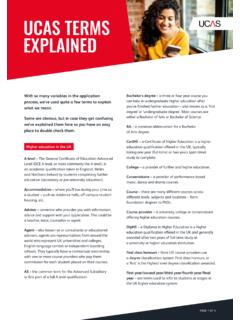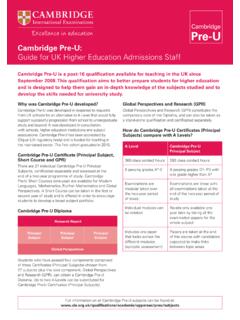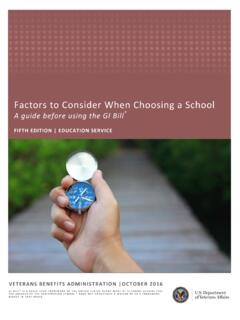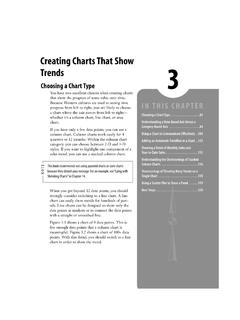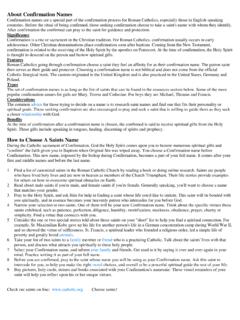Transcription of TIPS ON CHOOSING A LEVEL SUBJECTS - UCAS
1 TIPS ON CHOOSING A LEVEL SUBJECTS . There are a wide range of SUBJECTS to choose from. If you think you want to study certain SUBJECTS at university, or if you have a career area in mind, it's important to check if they have any particular A. LEVEL entry requirements. You may not yet know what you want to do after A levels, so here's a quick guide to making choices. The most important criteria for CHOOSING A levels SUBJECTS are: 1. What you are likely to enjoy and be good at? 2. Are there any particular SUBJECTS and grades you may need? If you have a particular career, job or further study in mind you may need to choose certain A levels in order to meet entry requirements. 3. How open you want to keep your future study and career choices? Ability and enjoyment think about the SUBJECTS you are good at and like. If you enjoy what you're studying you are likely to be more motivated. If you have ability in your chosen SUBJECTS you can increase your chances of success.
2 New SUBJECTS Schools and colleges may offer A levels in SUBJECTS that you have not studied before it's really worth taking some time to find out what's involved in new SUBJECTS (talk to your teachers and to staff at open days and open evenings). Subject combinations Some SUBJECTS cover common ground such as geography and environmental studies, or media studies and film studies. You need to check they're not too similar as some colleges and universities may not accept the combination for entry to higher LEVEL courses. Some subject combinations are complimentary and fit well together such as doing physics as well as mathematics or another science. This can help you in your studies and enable you to meet entry requirements for higher LEVEL courses in future. Some schools and colleges may have restrictions on subject combinations - so check your options. This can be particularly important if you're thinking of studying science SUBJECTS and are considering going to university.
3 Some degree courses specify the A LEVEL SUBJECTS (and grades) that you need. The table below gives examples of degree courses that require specific A levels: Degree LEVEL course A LEVEL SUBJECTS often required Biology Biology and another science or maths Chemistry Chemistry and sometimes maths and/or another science Dentistry Chemistry and one or two other sciences Engineering Maths and physics (or maths and chemistry for chemical engineering). Maths Maths Medicine Chemistry and usually one or two other sciences. Some require biology Modern languages Usually the language to be studied but this may vary for less common languages Veterinary Science Chemistry and one or two other sciences You can find out more about degree course entry requirements here Course content, assessment and workload Ask teachers and advisers about the workload of the SUBJECTS the essay writing, independent reading or project work you may be expected to do for each - and consider what this may mean for you and your choices.
4 You may find it helpful to look at course syllabuses (sometimes called specifications) which set out what you will study and what you will be expected to learn. The school or college you apply to will offer AS and A LEVEL qualifications from particular Awarding Bodies or exam board. You can check on UCAS Progress Search by searching for A levels at particular schools or colleges. Here are some links to the different Awarding body websites: AQA. OCR. Pearson Edexcel CCEA. WJEC. Future plans If you have a particular career, job or further study in mind you may need to choose certain A levels in order to meet entry requirements. Have a look at some career and job roles information here Universities usually require three A levels see more on thinking about university? You can also check entry requirements for university courses on the UCAS website at




